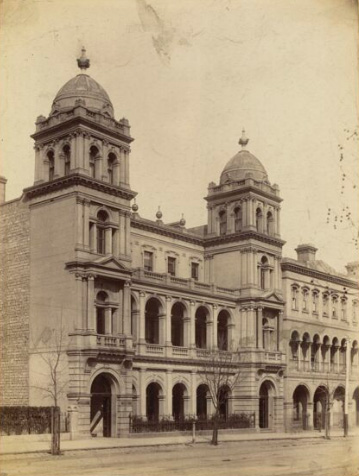
Freemasonry as it was in Victoria on that first ANZAC Day
Friday, April 24, 2020
When Australian and New Zealand soldiers were bravely facing fire at Gallipoli Cove on Sunday, April 25, 1915, Freemasonry was busy in Victoria, Australia. We take a random snapshot of Masonic life, as it was 105 years ago.
In Victoria’s Western District, the Hamilton Spectator newspaper (April 26) reported on the annual installation ceremony and investiture of officers of St George’s Lodge, Merino.
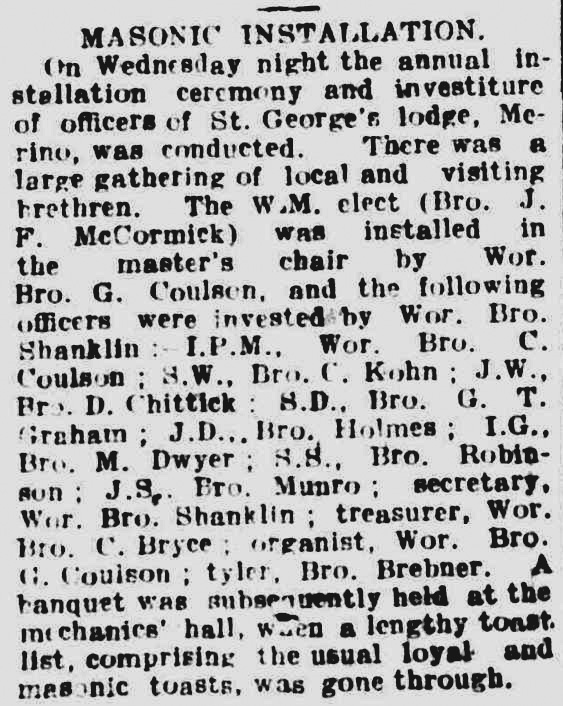
“There was a large gathering of local and visiting Brethren. The W.M. elect (Bro. J. F. McCormack) was installed in the master’s chair by Wor. Bro. G. Coulson, and the following officers were invested by Wor. Bro. Shanklin: I.P.M., Wor. Bro. C. Coulson; S.W., Bro. C. Kohn; J.W., Bro. D. Chittick; S.D. Bro. G.T. Graham; J.D., Bro. Holmes; I.G., Bro. M. Dwyer; S.S., Bro. Robinson; J.S., Bro. Munro; secretary; Wor. Bro. Shanklin; treasurer, Wor. Bro. C. Bryce; organist, Wor. Bro. G. Coulson; tyler, Bro. Brebner.
“A banquet was subsequently held at the mechanics’ hall , when a lengthy toast list, comprising the usual loyal and masonic toasts was gone through.”
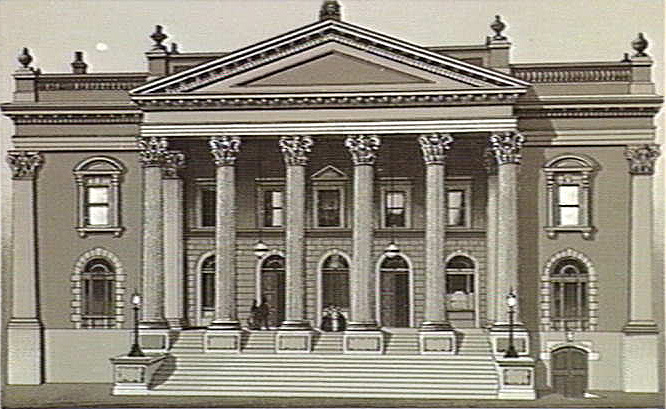
Photo courtesy: State Library of Victoria
At Bendigo, in that ANZAC week of 1915, the Bendigo Independent newspaper (Apr. 26, 1915) reported on the passing of a late brother, William Thomas Milburn.
“The funeral of the late William Thomas Milburn took place on Saturday afternoon for the Bendigo Cemetery. The cortege, left his late residence, Masonic Shades Hotel, View Street, and was largely attended by deceased’s numerous friends.
“The body was enclosed in a beautiful silver-mounted oaken casket and
borne to the grave in the Methodist portion by Messrs. J. Roscrow, J. Kilfeder, R Wilkinson, W. Goddard, W. H. Bradley and J. Veal. The pall
bearers were Sir John Quick, Messrs. W. H. Brown. J. J. Cocking, H. J. Martins, W. Pearsall, W. J. Parry.
“The Very Rev. Dean MacCullagh officiated at the graveside, after which the Masonic service was conducted by Worshipful Master C. Glover. The Masonic hymn, Holy Night, was sung.
“The Loyal James Roe Lodge, Druids’ Sandhurst Lodge Australian Natives’ Association, and also Sandhurst Rowing Club, were well represented. Amongst the many floral tributes were immortelles from the Sandhurst Rowing Club, Bendigo Bowling Club, Mrs. Lee, and Mr. and Mrs. Dunphy.
The funeral arrangements were conducted by William Farmer, MeCrae Street. “

In Melbourne, at the Masonic Hall in Collins St, the Melbourne Shakespeare Society celebrated its 31st anniversary and the birthday of Shakespeare with a musical and dramatic evening at the Masonic
Hall, .Melbourne, on the previous Friday evening (Apr. 23)>
Proceeds were to be given to the Belgian Relief Fund, and the audience
of about .500 included the Consul-genera! for Belgium (M. Ed. Lanwers)
and the vice-consul for France (M. Jules Homery).
Newspapers were publishing the first reports of ANZAC troops arriving in the Gallipoli region. The Bendigo Advertiser (Apr. 26, 1915) had big headlines.
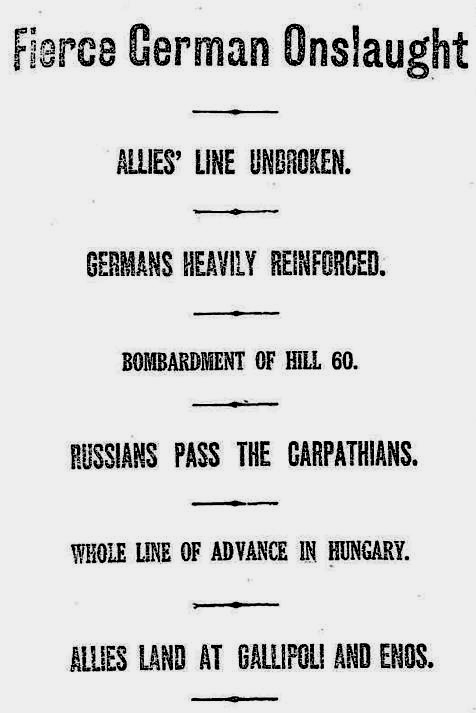
This was at a time when news was relayed by telegraph, with the latest messages conveyed by Morse Code.
“War Against Turkey. Attack on Dardanelles. Troops Land at Three Points,” said the headlines.
A dispatch from Athens said: “An official report states that a decisive action has begun in the Dardanelles. The Allies’ squadron, bombarded the Straits at various points west of Gallipoli.
“The landing has been effected at three points, namely at Cape Suvla and Bulair, on the Gallipoli Peninsula, and at Enos, north of the Gulf of Saros. The bombardment of the straits by the Allies continues.”
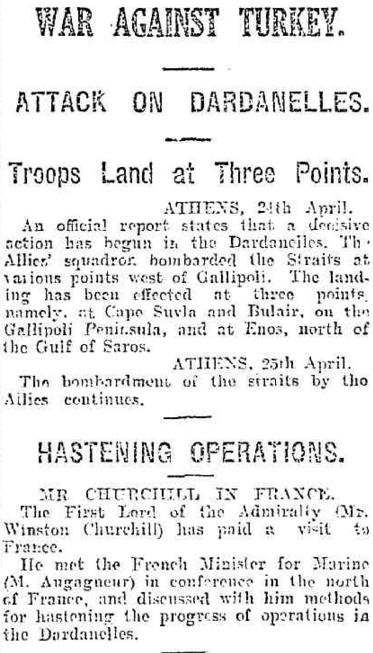
The Daylesford Advocate newspaper (Apr. 27, 1915) printed an account of funds being raised by Freemasons for the Belgian Relief Fund.
“Rathcr a novel method of raising funds for the .Belgian Relief Fund has
been inaugurated by the Skipton Masonic Lodge- A tremendous cherry
wood pipe (donated by Bro. K. G. Austin, of Borriyalloak) was submitted
to auction at the Lodge meeting, and realised 5s,” noted The Advocate.
“On Wednesday week it was brought to Beaufort, and whilst the brethren of the Fiery Creek Lodge were being entertained at supper Bro. W.H. Halpin was invited, to sell tile, pipe, it being explained that the idea was to pass it on from one Masonic Lodge to an other to raise funds for the Belgian Relief Fund.
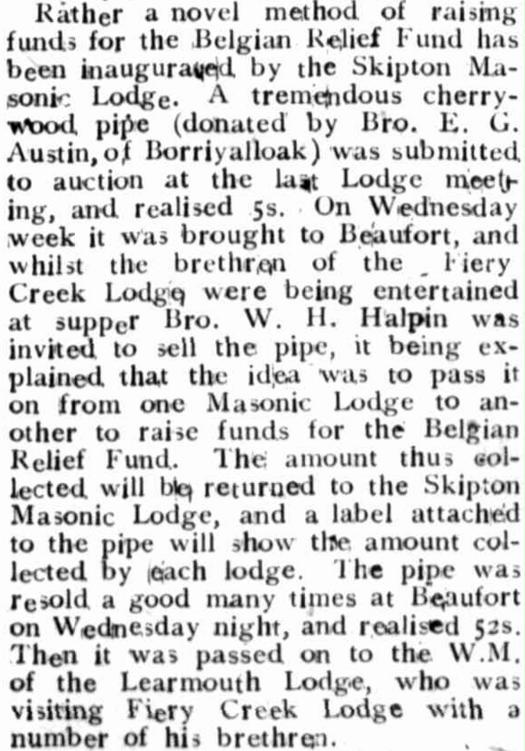
“The amount thus collected will be returned to the Skipton Masonic Lodge, and a label attached to the pipe will show the amount collected by each lodge. The pipe was resold a good many times at Beaufort on Wednesday night, and realised 52s.
“Then it was passed on to the. W.M. of the Learmouth Lodge, who was visiting Fiery Creek Lodge with a number of his brethren.”
There was sad news in Masonic circles at Castlemaine, according to The Bendigonian (Thu., Apr. 29, 1915): “An inquiry was held to-day by Mr. A.
Barlow, P.M., on the body of Mr. Thomas Odgers, J.P. The coroner’s verdict stated that deceased died from strangulation, caused by hanging himself whilst subject to a sudden and overpowering impulse, and while suffering from sudden mental aberration of mind owing to chronic insomnia.
“The funeral took place this afternoon to the Campbell’s Creek. Cemetery, when although it was announced to be private, the Mayor (Cr. Sheridan), councillors of the borough, leading Masonic, Oddfellows and Old Pioneer brethren were present. The Rev. H. W. Frederick conducted the burial
service.”

The Murchison Advertiser (Fri., Apr. 30, 1915) carried a report that combined aspects of billiard balls and Freemasonry: “The ordinary monthly meeting of the general committee of the Murchison Mechanics’ Institute was held at the library on Monday evening last, when there
were present — Messrs E. L. Teague (president), Parsons, Vickerman, Parker, Wagoner, G, Gregory, Cooney and Shewan (secretary).
“The secretary presented a financial statement for the period ended date of’meeting, this showing the bank overdraft at date to be £114 4s 4d. It was resolved to re-open the billiard room immediately, and the secretary was instructed to interview Mr Metcalf and ascertain if he was willing to again accept the position of marker. If Mr Metcalf was unable to accept the position, the secretary was empowered to make other arrangements.
“It was resolved, on the motion of Messrs Parsons and Parker, to purchase a new set of “bonzoline” billiard balls. It was resolved to instruct the caretaker to purchase additional crockery so as to bring the stock up to
the following quantities:—12 dozen cups and saucers, 6 dozen small, plates, half dozen sugar basins.
“Mr Cooney brought forward a suggestion from the Masonic Lodge, which body was contemplating a change in its place of meeting. He desired to know if the committee would be willing to rent the lodge the exclusive
right of the. institute, billiard room excepted, on sixteen occasions annually. It was pointed out by Mr Cooney that, although the exclusive right to the institute was asked, only the member’s room would be used.
“If an arrangement could be come to the lodge would require the committee to erect a’ new room at the rear of the institute, for the purpose of storing the lodge’s furniture, at an estimated cost of £25. After much discussion of a controversial nature it was resolved to entertain the lodge’s proposal, provided the members gave the committee a guarantee of five year’s tenancy, the rent to be at or about £12 per annum, the amount to be definitely decided upon at a later meeting of the committee.”
A Freemason – Dr Matthew Baird – was in the news in the week surrounding ANZAC Day 1915. Born at Mount Blowhard, Victoria, to Scottish-born parents Robert Baird, a farmer, and Agnes McKerrow, he attended Learmonth State School and University College in Ballarat.
After working on his father’s farm he served in South Africa from 1901 to 1902 as a trooper with the Victorian Mounted Rifles. After his matriculation in 1904 he was admitted as a solicitor in 1910, partnering with his brother Robert.
He married Ruby Melita Coutts in 1913. Having joined the citizen militia, he became a captain in 1913 and served in the Australian Imperial Force from 1915 to 1916 in Egypt and Gallipoli as a major, where he was wounded and sent home.
In November 1911 he had been elected to the Victorian Legislative Assembly for Ballarat West, representing the Liberal Party. From November 1917 to March 1918 he was Minister for Public Instruction; he later held the portfolios of Minister for Labour (1919–20) and Chief Secretary and Minister for Public Health (1919–23). Baird held the seat until its abolition in 1927, when he tried and failed to win the new seat of Ballarat. He died in 1930 at Ballarat.
Dr Baird was farewelled by the Learmonth Lodge, according to the Ballarat Courier newspaper: “At the meeting of the local Masonic Lodge. held here last Friday evening, a splendid gathering assembled to bid fare-
well to Dr Matthew Baird, M.L.A,. who holds the office of J.D. in the Lodge.
“A large number of visitors were also pre- sent from the Ballarat lodges, Beaufort and Clunes. The departing brother was accorded quite an ovation, and warm and enthusiastle eulogies were passed on him for the patriotic and manly step he was taking to help the Empire at the pro-
ment juncture.
“He was assured that his position in the Lodge would be kept for him on his return. Br Baird warmly thanked them for their good wishes, and
appreciated more than his words could express the kindly good feeling and brotherliness manifested towards him. He hoped to be spared to return, but the remembrance of that evening would help him to maintain and uphold the high opinion they had entertained of him.”
